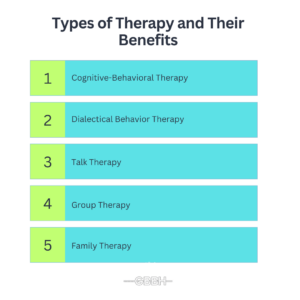Understanding our mental health is essential for living a balanced and fulfilling life. Many people wonder if they should seek therapy. If you’re unsure about whether you need help, asking yourself some key questions can provide clarity.
Life’s challenges can sometimes feel overwhelming, and while we all face difficulties, it can be tough to know when to seek professional help. Mental health is just as important as physical health, and understanding when you might need therapy is a key step toward emotional well-being. But how do you know when it’s time to seek therapy? Here are five questions to ask yourself that can help bring clarity to your mental health needs.
1. Are You Feeling Overwhelmed?
One of the first signs that you might need therapy is feeling overwhelmed. Life can bring many challenges, such as work stress, relationship issues, or family problems. If you often feel like you’re carrying a heavy load and struggling to cope, it may be time to seek help.
Therapy lets you explore your feelings and learn healthy coping strategies. It allows you to talk about what’s bothering you without fear of judgment. Many people find that mental health therapy programs help them feel lighter and more in control of their emotions.
2. Do You Have Trouble Managing Your Emotions?
If you notice that your emotions are hard to manage, therapy could be beneficial. Experiencing mood swings, anger, sadness, or anxiety can be overwhelming.
CBT is an effective treatment option for managing emotions. CBT helps in changing unhealthy thoughts that lead to emotional turmoil. A therapist can help you recognize these patterns and teach you techniques to cope better.
3. Are You Experiencing Changes in Your Daily Life?
Changes in your daily life can also signal a need for therapy. Have you lost interest in activities you used to enjoy? Are you isolating yourself from friends and family? These changes may indicate that you’re struggling with your mental health.
Therapy can help you explore the reasons behind these changes. With the support of a professional, you can work on setting goals and rebuilding your interest in life. Mental health treatment programs often focus on improving overall well-being and helping you find joy again.
4. Are You Struggling with Relationships?
Healthy relationships are crucial for mental health. If you find yourself having constant arguments with loved ones or feeling disconnected, it may be time to seek help. Relationships can be complicated, and sometimes we need an outside perspective to understand what’s going wrong.
Dialectical behavior therapy (DBT) is a great option for improving relationships. DBT helps individuals learn skills to manage emotions, reduce conflict, and improve communication. A therapist can guide you in learning how to express your feelings in a healthy way, making your relationships more fulfilling.
5. Have You Experienced Trauma?
If you’ve gone through a traumatic event, it’s essential to address those feelings. Trauma can have lasting effects on your mental health, leading to anxiety, depression, or other emotional difficulties. If you find that past events still affect your daily life, therapy can provide the support you need to heal.
Therapy can help you process trauma and develop coping strategies. Many mental health treatment centers in Massachusetts offer specialized programs for trauma recovery, ensuring you receive the care that suits your needs.
Additional Considerations for Seeking Therapy
The Role of a Therapist
A therapist can provide a safe, confidential space for you to explore your thoughts and feelings. They can guide you through difficult experiences and offer evidence-based strategies for managing mental health issues.
Therapy Is for Everyone
It’s essential to remember that therapy isn’t just for those in crisis. Many people seek therapy for personal growth, self-discovery, and to improve their overall quality of life.
Taking the Next Step: Mental Health Clarity
If any of these questions resonate with you, therapy might be the right step toward gaining mental health clarity. It’s important to remember that you don’t have to be in a state of crisis to benefit from therapy. Whether you’re dealing with mild stress or more serious concerns, seeking help is a proactive way to care for your mental health.
At Greater Boston Behavioral Health, we offer a variety of Mental Health Programs designed to support individuals on their journey to wellness. From cognitive-behavioral therapy to dialectical behavior therapy, our expert team is dedicated to helping you overcome challenges and regain control of your emotional well-being.
Conclusion
Deciding whether to seek therapy is a personal choice, but asking yourself these questions can help clarify your situation. If you’re looking for support, consider the Greater Boston Behavioral Health Center. This facility offers a variety of mental health therapy programs tailored to meet individual needs. Whether you’re seeking cognitive-behavioral therapy, dialectical behavior therapy, or other specialized treatments, the center has the resources to support your mental health journey. Don’t hesitate to reach out for help. Your mental well-being is worth it! Call us at (888)278-0716 today to learn more about our services and how we can help you on your journey to recovery!
FAQs about Therapy and Mental Health
What types of therapy are available?
There are various types of therapy, including cognitive-behavioral therapy (CBT), dialectical behavior therapy (DBT), and talk therapy, among others. Each type offers unique approaches to address mental health challenges.
How do I know if I need therapy?
If you find yourself frequently overwhelmed by emotions, struggling in relationships, feeling stuck, or relying on unhealthy coping mechanisms, it may be time to consider therapy.
Can therapy help with stress and anxiety?
Yes! Therapy can provide effective tools and strategies for managing stress and anxiety, helping you to develop healthier coping mechanisms and improve your emotional well-being.
Is therapy only for people in crisis?
No, therapy is beneficial for anyone seeking personal growth, emotional support, or tools for managing life’s challenges, not just those in crisis.
How can I find a mental health treatment center?
Research local mental health treatment centers online, check reviews, and consult with healthcare providers for recommendations. At Greater Boston Behavioral Health, we offer a variety of mental health programs to support your journey.


